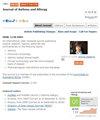Assessment of the Implementation of Global Initiative for Asthma (GINA) 2019 Guidelines for Treatment of Mild Asthma Among Pediatric Registrars: A Quasi-Interventional Study
IF 3.7
3区 医学
Q2 ALLERGY
引用次数: 0
Abstract
Background and Aims: It is essential to have proper treatment and management for asthma in order to minimise symptoms, lessen the burden, and lower the chance of exacerbations. To better control asthma, the purpose of this study was to evaluate and enhance paediatric registrars’ understanding and application of asthma treatment.Methods: The Sudan Medical Specialisation Board (SMSB) paediatric registrars provided data for this quasi-interventional study between April and September of 2021. Twice, both before to and following the intervention education sessions, the questionnaire was delivered. SPSS version 28 was used to analyse the data after it had been cleaned up in an Excel document.
Results: 203 (or 77.8%) of the 261 were women. A substantial rise from 8.1 ± 4.12 SD to 18 ± 5.03 SD in the mean overall knowledge score of registrars between the pre-and post-intervention periods. A significant difference (p=0.001) was observed in the post-intervention phase, with first-year registrars (R1) demonstrating higher scores than their senior colleagues. The registrars’ total knowledge scores did not differ significantly from one another during the pre-intervention period. The Global Initiative of Asthma (GINA) guidelines of management were implemented to a certain extent, according to the study. Of the registrars, 148 (56.7%) and 203 (77.8%) evaluated step one management in children ages 5 and under; 66 (25.3%) and 213 (81.6%) evaluated step one management in children ages 6 to 11; and 66 (25.3%) and 213 (81.6%) evaluated step one management in children ages 6 to 11 in pre- and post-intervention, respectively.
Conclusion: Given that the intervention in this study greatly increased registrars’ knowledge, doctors should obtain training on the GINA 2019 recommendations through conferences, workshops, and academic programmes. To find out why R1 outperforms their older counterparts, more investigation has to be done.
Keywords: asthma, GINA, management of asthma, Sudan
评估全球哮喘倡议(GINA)2019 年轻度哮喘治疗指南在儿科注册医师中的实施情况:准干预研究
背景和目的:对哮喘进行适当的治疗和管理对于最大限度地减少症状、减轻负担和降低病情恶化的几率至关重要。为了更好地控制哮喘,本研究旨在评估和提高儿科注册医师对哮喘治疗的理解和应用:方法:苏丹医学专业委员会(SMSB)的儿科注册医师在 2021 年 4 月至 9 月期间为这项准干预性研究提供了数据。在干预教育课程之前和之后两次发放调查问卷。在 Excel 文档中对数据进行清理后,使用 SPSS 28 版对数据进行分析。在干预前和干预后,注册人员的平均总体知识得分从 8.1 ± 4.12 SD 显著上升到 18 ± 5.03 SD。在干预后阶段观察到了明显的差异(p=0.001),第一年注册医师(R1)的得分高于其资深同事。在干预前阶段,注册医师的知识总分没有明显差异。研究显示,哮喘全球倡议(GINA)管理指南在一定程度上得到了执行。在登记员中,分别有148人(56.7%)和203人(77.8%)对5岁及以下儿童的第一步管理进行了评估;分别有66人(25.3%)和213人(81.6%)对6至11岁儿童的第一步管理进行了评估;分别有66人(25.3%)和213人(81.6%)在干预前和干预后对6至11岁儿童的第一步管理进行了评估:鉴于本研究中的干预措施大大提高了注册医师的知识水平,医生应通过会议、研讨会和学术项目获得有关 GINA 2019 建议的培训。要找出R1胜过年长者的原因,还需要做更多的调查。关键词:哮喘、GINA、哮喘管理、苏丹
本文章由计算机程序翻译,如有差异,请以英文原文为准。
求助全文
约1分钟内获得全文
求助全文
来源期刊

Journal of Asthma and Allergy
Medicine-Immunology and Allergy
CiteScore
5.30
自引率
6.20%
发文量
185
审稿时长
16 weeks
期刊介绍:
An international, peer-reviewed journal publishing original research, reports, editorials and commentaries on the following topics: Asthma; Pulmonary physiology; Asthma related clinical health; Clinical immunology and the immunological basis of disease; Pharmacological interventions and new therapies.
Although the main focus of the journal will be to publish research and clinical results in humans, preclinical, animal and in vitro studies will be published where they shed light on disease processes and potential new therapies.
 求助内容:
求助内容: 应助结果提醒方式:
应助结果提醒方式:


